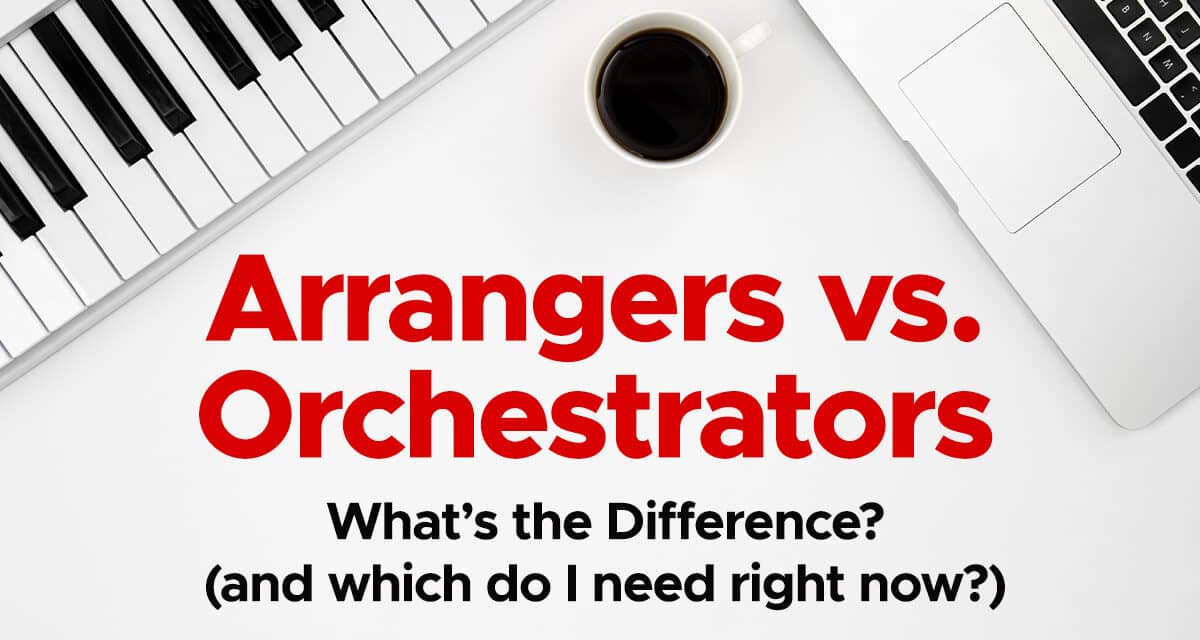Musical theatre arrangers and orchestrators are vital to taking your small-scale piano/vocal score to a full-fledged production. But which one does what? Let’s decipher the confusing lines between arrangers and an orchestrators in musical theatre.
Arranger vs. Orchestrator: What’s the Difference?
The terms “arranger” and “orchestrator” are frequently confused.
While the two roles are similar in that they’re brought onto a project after the songs are finished, that’s where the similarities end.
The best example I can share explaining the difference is from orchestrator Larry Blank (see video below or click here). If we take the song “Singin’ in the Rain” from the eponymous film, the composer and lyricist are charged with writing the actual song (“I’m singin’ in the rain, just singin’ in the rain…”). The arranger creates the intro before the song begins. And the orchestrator decides that flutes should play that intro before the song begins.
Orchestrators and arrangers are different in three main ways:
- what they work on
- what they specialize in
- when they are hired
Note: With all of these comparisons, PLEASE keep in mind, these are NOT hard and fast rules, but rather an observation of typical relationships for both positions.
Musical Theatre Orchestrators and Arrangers: what do they work on?
Responsibilities of a Musical Arranger
In general, arrangers work primarily on enhancing songs and scenes with additional musical material. For example, if a song requires an ensemble to sing harmonies, an arranger will write the harmonies for said ensemble. If a number requires a dance break, an arranger will work with the choreographer to create the music for said dance break. If the director wants underscoring for a scene, an arranger will work with the director to create the music for said scene, while seamlessly blending into the existing song’s style.
Responsibilities of a Musical Orchestrator
In general, orchestrators work from piano/vocal scores prepared by the arranger and composer. Orchestrators will work with the composer and producers to determine instrumentation for the show as well as the number of players available. While they may receive some notes/ideas from the composer and arranger, the orchestrator are the primary decision maker all existing musical instrumentations, from songs to scene underscores.
For example, the orchestrator may decide that high trumpets and percussion are the best way to accent hits in the dance break, while cello and clarinet best suit the intimacy of an underscored scene.
Notice how the arranger works frequently with members of the creative team such as the composer/lyricist, choreographer, and director rather than the orchestra. In contrast, the orchestrator primarily works with the orchestra, composer, and arranger rather than the director and choreographer.
Specializations of Musical Theatre Orchestrators and Arrangers
Arranger Specialties in Musical Theatre
Since there are so many aspects of a show arrangers can work on (e.g., adding harmonies for the ensemble, crafting music for dance breaks, etc.), many arrangers specialize in a particular aspect of musical theater arranging. For example, vocal arrangers such as AnnMarie Milazzo (Spring Awakening, Next to Normal, A Beautiful Noise) specialize in writing thrilling harmonies for actors. Similarly, dance arrangers such as David Dabbon (Beetlejuice, Funny Girl, Dancin’) specialize in crafting show stopping dance breaks. There are certainly arrangers who do all facets of arranging including as Alex Lacamoire (In the Heights, Hamilton, Dear Evan Hansen) and Glen Kelly (The Producers, The Book of Mormon, The Prom), but it’s not unheard of to have multiple arrangers on a project.
Orchestrator Specialties in Musical Theatre
In contrast to arrangers, there is typically one orchestrator responsible for orchestrating the entire show. While they tend to have areas of specialty, orchestrators at the top level such as Mary-Mitchell Campbell (For the Girls, 2006 Revival of Company), Larry Blank (Holiday Inn, Catch Me If You Can) and Tom Kitt (American Idiot, Spongebob the Musical) are equally comfortable in orchestrating a wide variety of genres and instrumentations.
Musical Theatre Arrangers and Orchestrators: When are they hired?
Musical Theatre Arrangers
In musical theatre, arrangers are typically brought in after the show’s first table read where the creative team is looking to pitch their show or prepare for an upcoming production. Arrangers often follow the show through its various productions as the show evolves.
Musical Theatre Orchestrators
Orchestrators do not come in until right before a major production of the musical opens. This is due to the ever-evolving nature of musical production; why put icing on a cake that’s not even fully baked? Typically, they have a month to orchestrate the show before the first read through with the orchestra.
How to find an Arranger or Orchestrator for Your Musical
Arrangers and orchestrators can be found in a variety of means ranging from personal recommendations to online forums (Facebook, Instagram, Musicalwriters.com, etc.). In my opinion, I recommend reaching out to colleagues for recommendations first rather than going through online methods. If you do decide to go the online route, I recommend meeting with your prospective arranger/orchestrator and request samples of their work to see if your show matches their skill set.
Final Thoughts
Musical theatre arrangers and orchestrators are key players in the development of musicals from concept to full production. However, they have very different functions and responsibilities in a show’s development. I hope this provides useful insight into these different roles.
For more information on Musical Theatre Arrangers and Orchestrators, check out the following MW articles and resources:



















